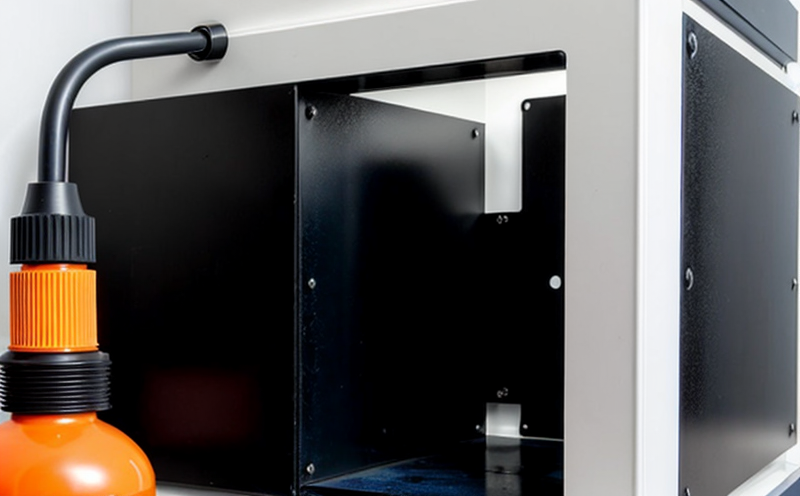ISO 20340 Corrosion Resistance of Protective Coatings in Marine Environments
The ISO 20340 standard is crucial for ensuring that protective coatings used in marine environments are capable of effectively resisting corrosion. This standard provides a standardized approach to testing the resistance of protective coatings against corrosive conditions, which can vary significantly depending on the specific marine environment where these materials will be deployed.
The test procedure described by ISO 20340 involves subjecting coated specimens to immersion in seawater for extended periods. The performance of the coating is then assessed based on visual inspection and measurement of any weight loss or other signs of corrosion that may have occurred. This testing method ensures that coatings meet stringent standards for durability, particularly important given the corrosive nature of marine environments.
The standard applies to a broad range of protective coatings used in various sectors such as shipbuilding, offshore oil and gas platforms, harbors, and marine structures. Compliance with ISO 20340 is essential for manufacturers aiming to ensure their products meet international quality standards and can withstand harsh marine conditions without degradation.
Before testing begins, it's critical that the specimens are prepared according to specified guidelines in the standard. This includes cleaning the surface of the coating thoroughly and ensuring consistent application techniques. The test procedure itself involves immersing the coated specimen into seawater for a predefined duration, typically 168 hours (7 days). During this period, close monitoring is conducted to observe any signs of corrosion.
Once testing concludes, detailed measurements are taken to assess changes in weight and other physical properties. These results form the basis of evaluating whether the coating meets the stringent requirements outlined in ISO 20340. The standard also includes acceptance criteria that specify permissible levels of corrosion or degradation for different types of coatings.
The significance of this testing cannot be overstated, especially given the high stakes involved when it comes to protecting critical marine infrastructure from corrosion damage. Failure to meet these stringent standards can lead to costly repairs and potential safety hazards. Therefore, compliance with ISO 20340 is not just a formality but a necessity for ensuring long-term reliability of protective coatings in marine applications.
Understanding the nuances of this standard helps stakeholders appreciate its importance in safeguarding marine assets against corrosion. By adhering to these rigorous testing protocols, manufacturers and users alike can rest assured that their products are up to par with international standards designed specifically for marine environments.
| Test Specimens | Duration of Immersion | Environmental Conditions | Evaluation Criteria |
|---|---|---|---|
| Ceramic-coated surfaces, metallic structures, and composite materials | 168 hours (7 days) | Seawater environment | Weighing changes, visual inspections for corrosion signs |
Why It Matters
The importance of ISO 20340 cannot be overstated in the context of marine environments where protective coatings play a critical role. Marine environments are notorious for their aggressive nature, characterized by high humidity levels and exposure to saltwater, which can rapidly lead to corrosion if not properly protected.
Protective coatings designed for use in such hostile conditions need to meet stringent performance criteria to ensure they provide adequate protection over extended periods. Failure to do so could result in significant structural integrity issues, posing risks to both personnel safety and operational efficiency.
The durability of protective coatings is particularly critical in high-profile sectors like shipbuilding and offshore oil and gas platforms. These industries demand reliable coating solutions that can withstand extreme conditions without compromising on performance. Meeting the requirements set forth by ISO 20340 ensures that manufacturers deliver products capable of meeting these demanding specifications.
Compliance with this standard also contributes to broader environmental considerations by promoting sustainable practices in coastal and maritime operations. By ensuring effective corrosion protection, industries can minimize unnecessary waste from premature failures and reduce the need for frequent replacements, thereby enhancing sustainability efforts.
In summary, ISO 20340 is vital because it establishes a benchmark for evaluating protective coatings used in marine environments. This ensures that only coatings capable of providing reliable performance under challenging conditions are approved, ultimately contributing to safer operations and more sustainable practices within the sector.
Industry Applications
- Shipbuilding: Ensuring durability against corrosion for various parts including hulls, propellers, and anchor chains.
- Offshore Oil & Gas Platforms: Protecting critical structures like pipelines, risers, and jackets from corrosive seawater.
- Harbors & Marine Structures: Providing protection to piers, breakwaters, and other infrastructure exposed to saltwater environments.
- Marine Transport: Enhancing the longevity of cargo ships, containers, and other vessels operating in saltwater.
| Sector | Main Application |
|---|---|
| Shipbuilding | Hull protection against saltwater corrosion |
| Offshore Oil & Gas Platforms | Pipeline and jacket protection from seawater |
| Harbors & Marine Structures | Pier and breakwater reinforcement |
| Marine Transport | Vessel hull and component corrosion prevention |
Customer Impact and Satisfaction
By adhering to ISO 20340, customers can expect high-quality protective coatings that are dependable and capable of withstanding the rigors of marine environments. This ensures enhanced reliability in critical applications, reducing maintenance costs and extending the lifecycle of assets.
The standard also promotes transparency and consistency across different markets by providing a universally accepted method for testing corrosion resistance. This aligns expectations between manufacturers, distributors, and end-users, fostering trust and confidence in product performance.
Customers benefit from knowing that their choice of protective coatings meets rigorous international standards, thereby reducing the risk of premature failure or degradation due to inadequate protection against corrosive elements.
Furthermore, compliance with ISO 20340 demonstrates a commitment to quality and safety, which is increasingly important in today's competitive market. This can lead to improved customer satisfaction, as stakeholders appreciate the reliability and integrity provided by products that meet such stringent requirements.
In summary, meeting the demands of ISO 20340 not only enhances product performance but also builds stronger relationships with customers through consistent quality and reliable protection solutions tailored for marine environments.





